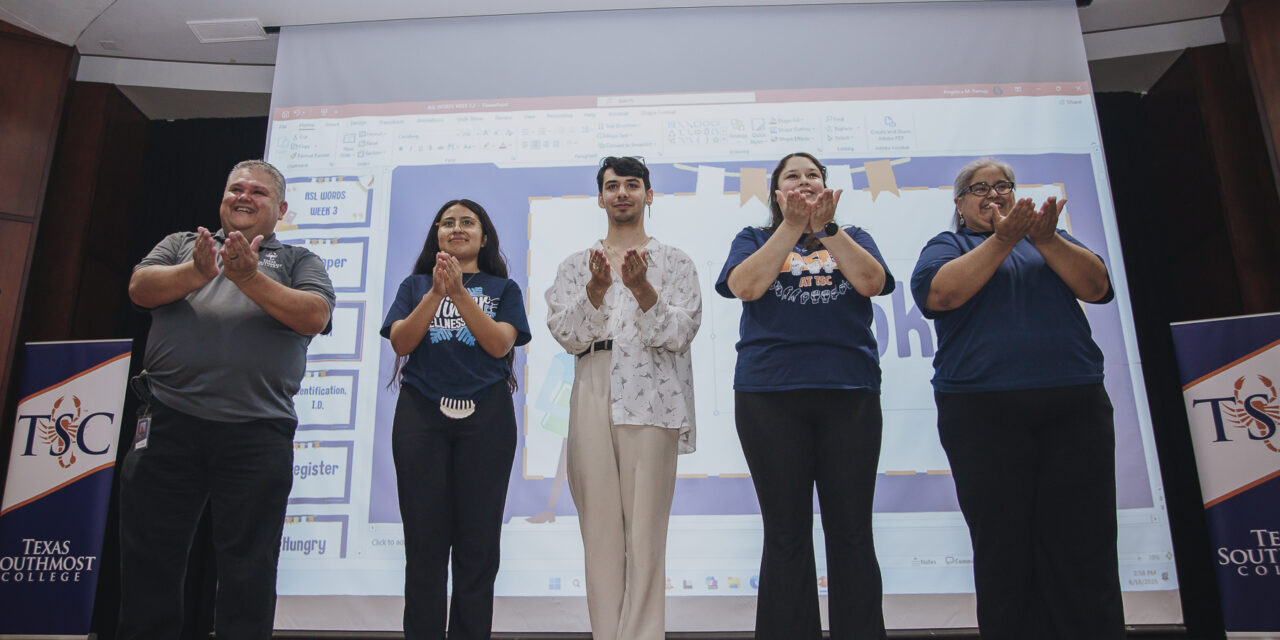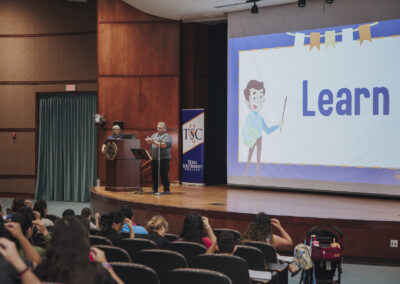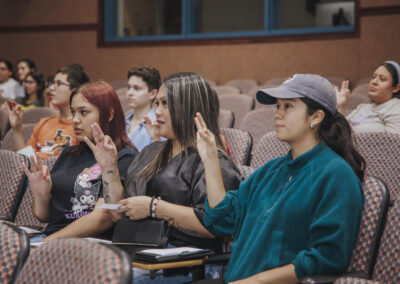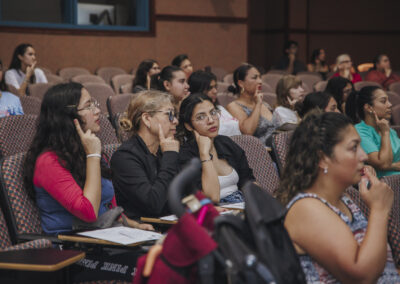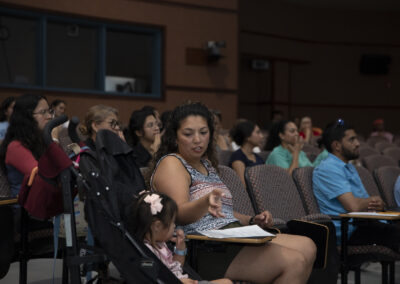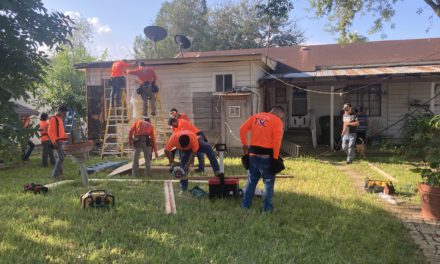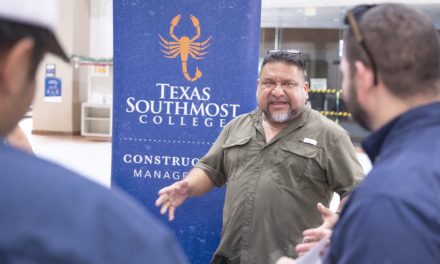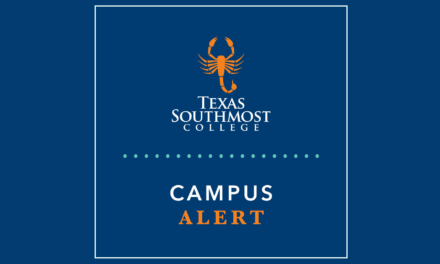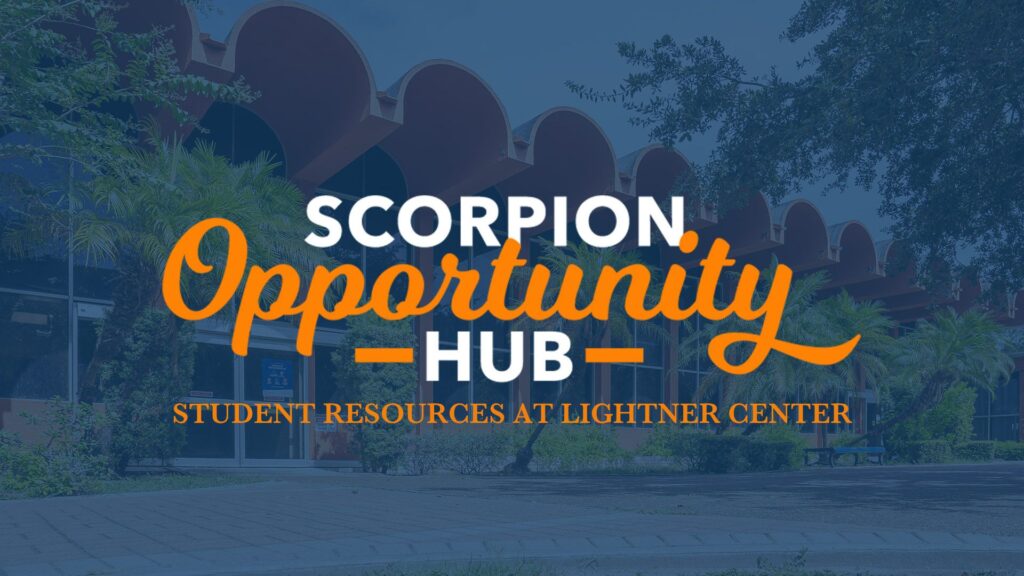Members of TSC’s Counseling and Student Accessibility Resources and ASL Club demonstrate the sign for “book” for those gathered in attendance for the third meeting of Summer ASL Courses. The free classes are a way to invite the public to broaden their horizons by learning a language that can help connect them with new people. Pictured left to right: TSC Sign Language Interpreter Frank Slovak, ASL Club member Lizbet Mar, ASL Club Vice President Octavio Sosa, ASL Club member Eva Robles, and TSC Sign Language Interpreter Angelica Ramos.
Every summer, Texas Southmost College has opened its doors to the community through a unique and impactful initiative in the form of free American Sign Language (ASL) classes aimed at expanding accessibility, promoting inclusivity, and encouraging lifelong learning.
Having just completed its third week of this summer’s session, the current ASL series has welcomed learners from all backgrounds. Some are motivated by personal connections to the Deaf community, others by a desire for enrichment or professional development, but all equally eager to learn. Participation is open to the public at no cost, and organizers encourage attendance to help raise awareness about Deaf and hard of hearing individuals who use sign language as their primary mode of communication and foster inclusive communication practices.
The sessions are led by Frank Slovak, a Sign Language Interpreter with TSC and the head instructor for this summer’s classes. Slovak, who also works with the college’s Counseling and Student Accessibility Resources Department, brings years of experience working with the Deaf and hard-of-hearing community.
“I have been working as an educational interpreter for 20 years, and I have been with TSC for almost 12 years now,” said Slovak. “My main responsibility and title is Sign Language Interpreter, moreover while at the office, my workmates, Susy Garza and Angelica Ramos, and I assist students who need accessibility services. The goal of our office is to provide for our students support and equal access. Services provided at our department are accessibility resources such as sign language interpreter, use of assistive technology, extended time for tests and quizzes, just to name a few. Counseling is also offered by our Licensed Professional Counselor, Mr. Mario Garcia.”
The idea for the free ASL classes naturally developed from that shared mission.
“Our team collaborated on how we could serve our community during the summer months and we have been doing it ever since. I would say we started in the year 2016. We also had a couple of summer classes on Zoom during COVID.”
In each session, participants review previously covered material and build on what they’ve learned with a combination of direct instruction and engaging, interactive activities. In the most recent class, students began with a review of basic letters, numbers, and signs introduced in the previous week, followed by a 20-sign quiz to reinforce retention. Afterward, learners were encouraged to introduce themselves using ASL, using their existing vocabulary while instructors provided light guidance and new phrases to expand the conversation. So far, students have learned over 100 signs, with plans to begin constructing basic short sentences in upcoming sessions.
Slovak says the structure is designed to both help reinforce fundamentals and show learners the potential for real-world connection.
“The overall goals these classes try to achieve are breaking down the communication barrier that exists and building a bridge between individuals who hear and don’t know sign language and deaf individuals who are users of American Sign Language. In our sign language classes we have had professionals, students, faculty, families, and those in the working class who know, work, or have come in contact with someone who uses ASL and wish to communicate more fully with them. These classes teach basic level sign language which will allow the learner to have a beginner level conversation, opening the door to more significant exchanges in the future.”
A significant piece of the configuration is the TSC ASL Club, whose support Slovak says plays an important role, as club advisor, during the academic year and helps reinforce the college’s long-term investment in accessibility.
“The ASL Club is active during the Fall and Spring semesters, and our members meet twice each week where we discuss club matters and learn sign language through interactive games. A few of our students have decided to transfer to a neighboring university that offers ASL Interpreting as a major for those seeking a career as a Sign Language Interpreter. Several club members who are now associating more with deaf and hard of hearing individuals who use sign language for communication have become capable signers. I am very proud of our members who continually show their willingness to learn this unique language.”
According to Slovak, the classes often attract people with no prior ASL experience, and the impact extends far beyond vocabulary.
“Of course, there are some cities that have a higher concentration of deaf population than ours, but by learning sign language, opportunities are opened up for enhanced communication which will foster understanding, build trust, and may help resolve conflicts, ultimately leading to positive outcomes. Interestingly, we’ve also had retired couples come to our classes to enhance their cognitive skills. It’s always great to see people benefitting in many different ways from our classes.”
TSC ASL Club Vice President Octavio Sosa has been assisting with instruction throughout the course and says the classes have offered more than just vocabulary.
“We’ve seen a lot of participation from the local community wanting to learn a little more, and it’s been really uplifting and encouraging to see how enthusiastically they’ve been participating while learning more about the language. With any language, the desire to learn has a lot to do with wanting to develop a genuine sense of closeness and community with others who know the language and those who are also learning.”
Through these free ASL courses, TSC continues to model its commitment to educational access, community engagement, and the celebration of inclusive language practices, one sign at a time. For those interested in participating, classes are held every Wednesday in June and July, 3 pm – 4 pm, at TSC’s SET-B Lecture Hall.
TSC Summer ASL Classes
TSC Sign Language Interpreter Frank Slovak leads the students through an assortment of new signs. Assisted by fellow Sign Language Interpreter Angelica Ramos, the classes are designed to gradually help build the students’ ASL vocabulary on a weekly basis.
TSC Summer ASL Classes
TSC’s free Summer ASL Classes draw in students and members of the local community eager to learn more about American Sign Language through direct participation.
TSC Summer ASL Classes
Students in the class watch intently as they practice new ASL signs along with the instructors. Active participation plays a significant role in learning a new language such as ASL.
